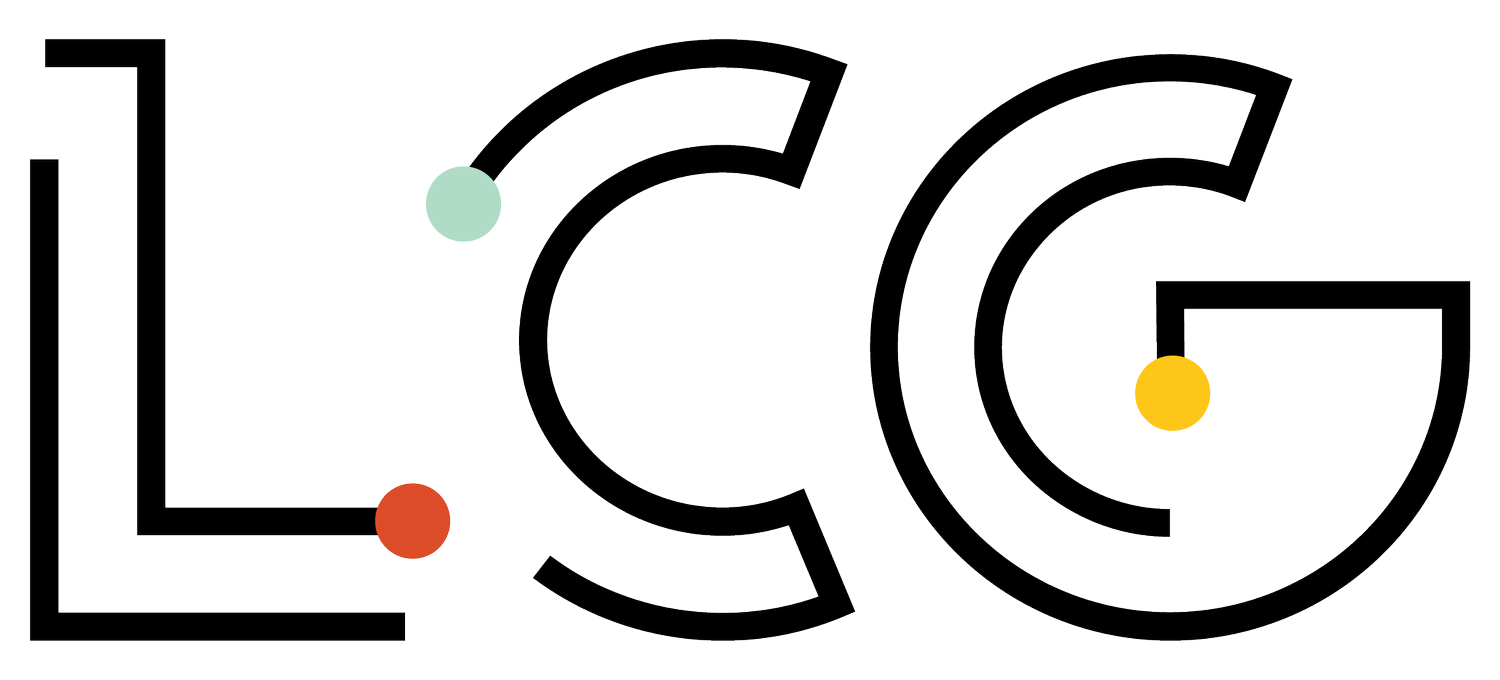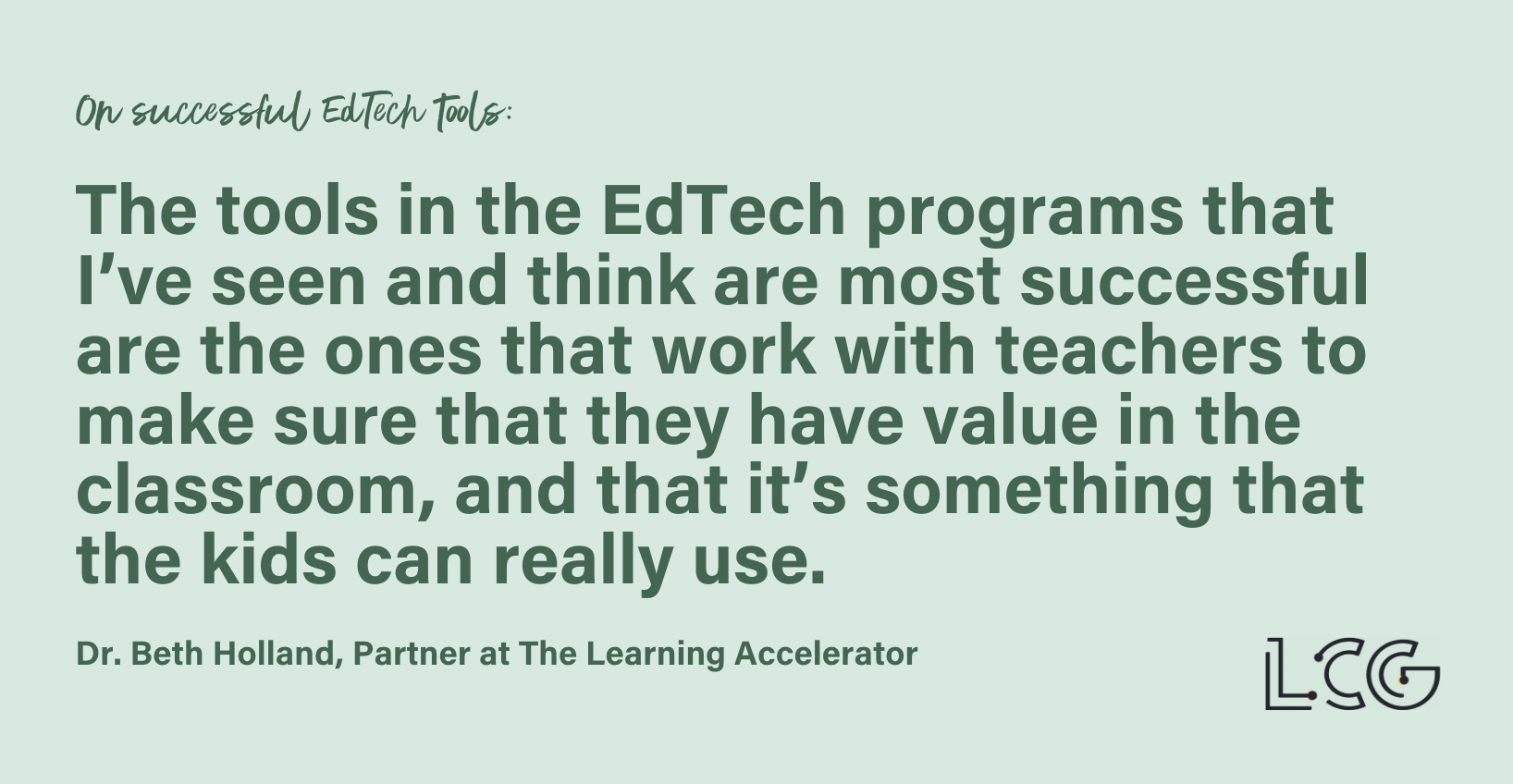We sat down with Dr. Beth Holland, a Partner at The Learning Accelerator (TLA), a national nonprofit working to ensure that every student receives the effective, equitable, and engaging education they need to reach their full and unique potential, for this episode of All Things Marketing and Education. Beth talks with Elana about the nuances and challenges of achieving digital equity, explains why the most successful EdTech products are often the simplest ones, reframes “learning loss” as “unfinished learning,” and so much more.
Listen to the entire episode and check out some of our favorite parts of the conversation below. Also, this episode had a lot of resources. Make sure to scroll to the bottom to access the many tools, terms, and resources mentioned.
Digital Equity is More than Just Digital Access
Beth raises an important distinction: digital equity isn't the same as digital access. She explains that over the past few years, our focus has been on access to tools and high-speed Internet, which she admits is also extremely important. But she asks us to look beyond that and consider whether students have ownership of their digital space once they gain access to it:
"Do they own the way that things are set up? Can they actually configure the device to meet their needs? Can they make sure that they have the tools and the resources that they think are the most important?"
She notes that students from more affluent families can often choose their own devices and get almost any software or app that they need. They can also configure their device to meet their needs and use them without the restrictions of district logins or filters. However, if the only option that a student has is a district-issued device, then they may not have these options. In many ways, they are learning in borrowed - and monitored - space. Beyond these challenges, districts might not offer students the processing power or applications to pursue their interests - whether that be in art, music, or STEM. Oftentimes, purchases are made in bulk and not with individual interests in mind. She vividly remembers this question from one district leader:
"The opportunities we’re creating, the tools that we’re promoting, do our students really feel motivated by them? Do they see themselves in the technology, and do they think that the opportunities honor their identity?"
In terms of instructional practices and the systems supporting K-12 students, Beth asks, “Are current education policies leading toward equity – honoring students' needs, identities, voices, histories, and cultures – or are they actually undermining equity initiatives?”
The Best EdTech Products are often the Simplest EdTech Products
Beth has observed that a disconnect between theory, design, and practice often exists with EdTech products. For a product to be successful, it needs to be founded in solid pedagogy and be designed to work within the realities of a classroom. She adds:
"The tools in the EdTech programs that I’ve seen and think are most successful are the ones that work with teachers to make sure that they have value in the classroom, and that it’s something that the kids can really use. And that they develop those really concrete teacher materials around how they could be most effective."
She encourages districts to explore a reasonable range of tools, present them to their staff for evaluation, and ensure that teacher recommendations inform purchasing decisions. Maybe then there would be more tools like one of her favorites, Book Creator.
"I love the way that they narrowed it [the interface] down. There’s three buttons and unlimited possibilities. They understood the realities of having that child or teacher who’s not as familiar with technology, and yet be able to use a tool and have it quickly have an impact in the classroom."
Reframing “Learning Loss” as “Unfinished Learning”
Beth says that The Learning Accelerator prefers to use the term "unfinished learning" instead of "learning loss," because it reflects an asset-based approach that provides more useful ways of looking at the data.
"It acknowledges that not every kid had the opportunity and experience. Things were unfinished because they didn’t have the resources to do the learning. If we had only looked at, say, the average scores, and we took a deficit mindset, then we would have said, 'Oh, look, these kids, their scores are lower.' Instead, we were able to say, 'Look how much they gained.'"
This framework became the basis for TLA's “How To” guide for schools and districts that wanted to take this approach, which in turn allowed them to measure progress over time. Beth recalls how one of the school districts they studied showed favorable growth trajectories in traditionally disadvantaged populations, contrary to national patterns for these groups. Knowing where to look, she was able to hone in on the reasons.
"We found out there were additional layers of support. There was a program called Healthy Start that made sure that all of the kids were fed and clothed and they had access. It raised the question of how do we scale this to more kids?"
Here's the full transcript of Beth’s podcast episode.
Resources Mentioned in this Episode:
About the Learning Accelerator:
The Learning Accelerator (TLA), a national nonprofit whose mission is to connect teachers and leaders with the knowledge, tools, and networks they need to transform K-12 education.; Beth leads their work in research and measurement
Resources from the Learning Accelerator, including new guides, resources, and core content that TLA is working on.
Digital Equity Guide, The Learning Accelerator's free resource for providing equitable access to knowledge, one of Beth's projects over the past two years
Strategy Lab, The Learning Accelerator's cohort-based learning opportunity for districts to explore how virtual and hybrid capabilities can advance equitable, personalized, and accelerated learning for students.
About CoSN:
Consortium of School Networking (CoSN), a membership organization supporting K-12 EdTech leaders, where Beth served as Digital Equity Project Director
Digital Equity Initiative, Beth previously led CoSN's program for bringing digital access tools to all students
Rural Initiative, Beth previously led CoSN's program for modernizing digital technology in rural school districts
Apps, platforms, and curricula:
Book Creator, Beth's example of easy-to-use EdTech
Choices program, a U.S. history curriculum cited by Beth for its focus on building discrete skills and competencies
NWEA MAP Growth, the Northwest Evaluation Association's assessment for measuring achievement and growth in K–12 math, ELA, and science
i-Ready, an adaptive platform developed by Curriculum Associates to help educators understand their students’ progress in reading and math
DreamBox Map Assignments, an app used in conjunction with NWEA MAP Growth
Organizations:
National Digital Inclusion Alliance, a research and advocacy organization
InnovateEDU, a nonprofit focused on next-gen learning models to eliminate the opportunity gap;
SETDA, the State Educational Technology Directors Association, a national organization of state-level EdTech leaders that Beth praises for its similar mission to CoSN's
Books:
The Digital Edge: How Black and Latino Youth Navigate Digital Inequality, by S. Craig Watkins & Alexander Cho
Teaching for Understanding With Technology, by Martha Stone Wiske, Kristi Rennebohm Franz & Lisa Breit
Understanding by Design, by Grant Wiggins & Jay McTighe
Terms:
Instructional design, the purposeful creation of instructional materials, a concept that Beth embraces
Policy:
Digital Equity Act, a pending federal legislation
E-Rate, a Federal Communications Commission program to make telecom and information services more affordable for schools and libraries; Beth notes that it was updated to include home Internet access during the pandemic
Office of Educational Technology, a project by the US Department of Education focused on developing national EdTech policy; one of Beth's collaborators on the Digital Equity Guide now serves as an Impact Fellow there
All Things Beth:
Beth on the Classroom Caffeine podcast, Season 2, Episode 22, 3/15/22
Elana Leoni, Host
Elana Leoni has dedicated the majority of her career to improving K-12 education. Prior to founding LCG, she spent eight years leading the marketing and community strategy for the George Lucas Educational Foundation where she grew Edutopia’s social media presence exponentially to reach over 20 million education change-makers every month.
Beth Holland, Guest
Dr. Beth Holland is a Partner at The Learning Accelerator (TLA), a national nonprofit working to ensure that every child receives the engaging, equitable, and effective education needed to reach their full and unique potential. She leads the organization's research and measurement initiatives, including evaluations of programs to support student-centered learning, and building research-practice partnerships in support of systems improvement and innovation. Beth brings over 25 years of experience as an educator and researcher examining challenges of equity and communication within K-12 public school systems. Prior to joining TLA, she led the Digital Equity and Rural initiatives for the Consortium of School Networking (CoSN) and completed a postdoctoral research fellowship on a project funded by the U.S. Department of Education’s Ready to Learn Initiative at the University of Rhode Island. She has also worked as a teacher, administrator, and professional learning developer in schools across the country. Beth holds an Education Doctorate (Ed.D.) in Entrepreneurial Leadership in Education from Johns Hopkins University, a Master's degree (Ed.M.) in Technology, Innovation, and Education from Harvard University, and a Bachelor of Science (B.S.) degree in Communications from Northwestern University.
About All Things Marketing and Education
What if marketing was judged solely by the level of value it brings to its audience? Welcome to All Things Marketing and Education, a podcast that lives at the intersection of marketing and you guessed it, education. Each week, Elana Leoni, CEO of Leoni Consulting Group, highlights innovative social media marketing, community-building, and content marketing strategies that can significantly increase brand awareness, engagement, and revenue.
Rate, Like, and Subscribe
Let us know what you thought about this episode by rating and reviewing our podcast. Click here, scroll to the bottom, tap to rate with five stars, and select “Write a Review.” Then be sure to let us know what you loved most about the episode! Also, if you haven’t done so already, subscribe to the podcast to be notified when we have more content to share with you.





